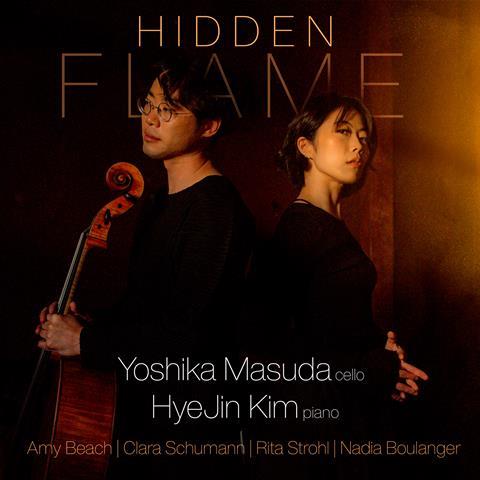Fine playing is undermined by a problematic recording

The Strad Issue: June 2024
Description: Fine playing is undermined by a problematic recording
Musicians: Yoshika Masuda (cello) HyeJin Kim (piano)
Works: Beach: Romance op.23. Boulanger: Three Pieces. Esmail: one word makes a sound. Paradis: Sicilienne. Schumann: Romances op.22. Strohl: Grande Sonate Dramatique
Catalogue number: AVIE AV2653
It should be a cause for celebration that none of these composers any longer counts as ‘neglected’. On the other hand, Yoshika Masuda and HyeJin Kim thus come up against serious competition. The Romances of Beach and Clara Schumann were written with violin in mind, and the baritonal strain of Masuda’s phrasing does not persuade me that they sit well on the cello. At the other end of the album, Nadia Boulanger makes the point for me: her cello-conceived Three Pieces spin their exquisite melodies more idiomatically even in the instrument’s upper register.
The album’s centrepiece in every way is Rita Strohl’s tremendous sonata. She based it, in Lisztian fashion, on the story of the Roman general Titus, his love for Berenice and politically expedient rejection of her, as translated by Molière. The tale is told through both strong motivic association and heaving drama (mostly) contained within the bounds of symphonic sonata form. Masuda overcomes the work’s considerable demands on stamina and agility, though I find him a touch impersonal compared to Edgar Moreau (Erato) and Sandra Lied Haga (Simax – see her perceptive piece on the sonata in The Strad ’s April 2023 issue).
Watch: Noah Bendix-Balgley performs Romance by Amy Beach
Review: Takács Quartet: Elgar, Beach
Review: Tasmin Little; John Lenehan: Clara Schumann, Ethel Smyth, Amy Beach
For all Masuda’s undoubted artistry, however, and Kim’s restraint in handling a weighty piano part, they are undone by the studio acoustic, which contrives to be uncomfortably close, resonant and ill-defined all at once. The piano’s bass register obtrudes even though the cellist is nearer the microphone, least helpfully so in Reena Esmail’s six-minute, raga-like meditation. The sound is more satisfactory on headphones, but still congested when Strohl’s sonata (not infrequently) gathers intensity.
PETER QUANTRILL











































No comments yet